
Question Number 6914 by Tawakalitu. last updated on 02/Aug/16
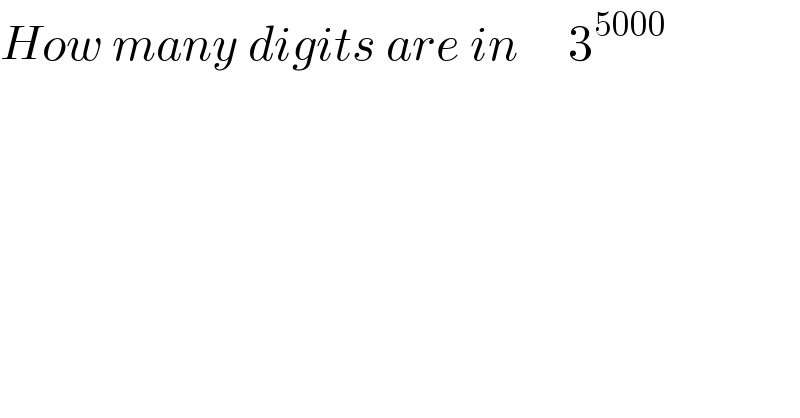
$${How}\:{many}\:{digits}\:{are}\:{in}\:\:\:\:\:\mathrm{3}^{\mathrm{5000}} \\ $$
Commented by Rasheed Soomro last updated on 03/Aug/16
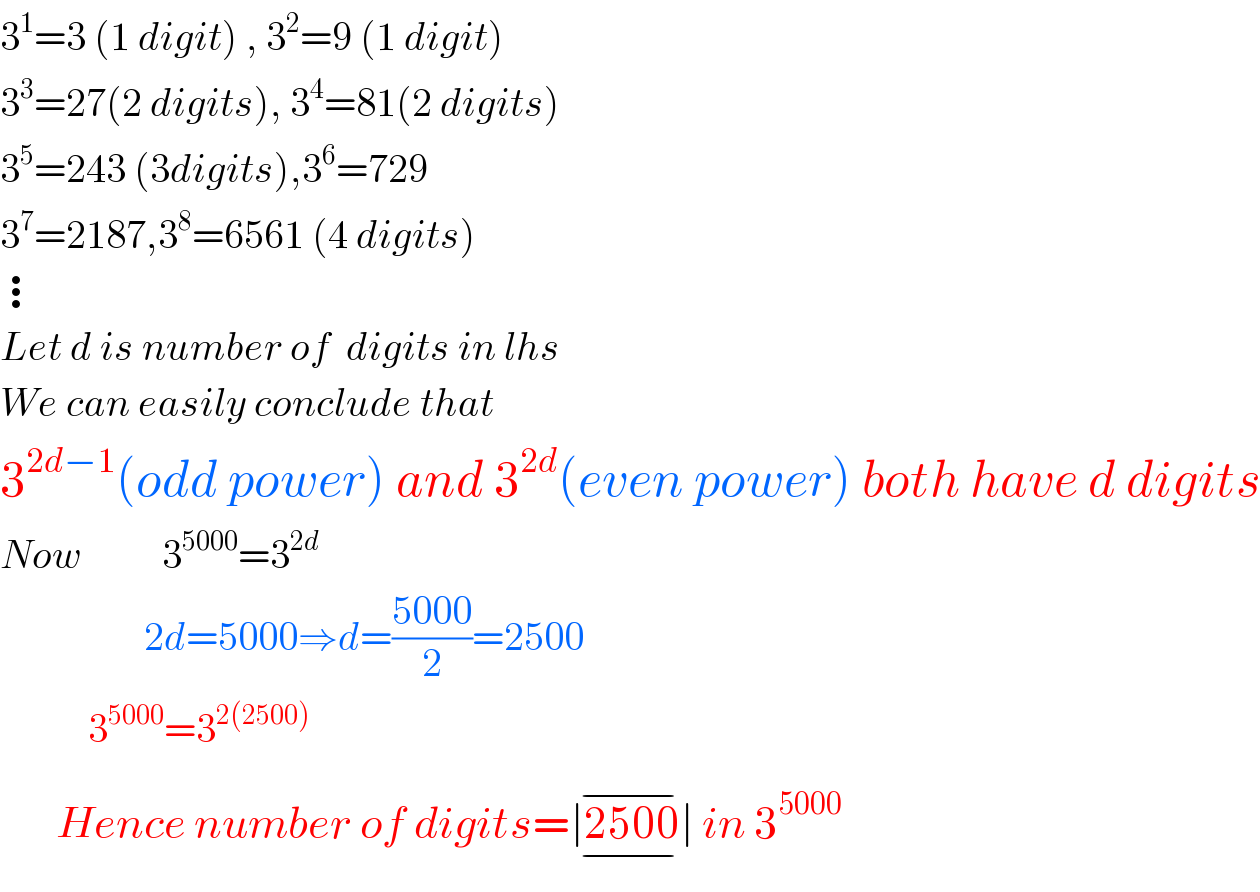
$$\mathrm{3}^{\mathrm{1}} =\mathrm{3}\:\left(\mathrm{1}\:{digit}\right)\:,\:\mathrm{3}^{\mathrm{2}} =\mathrm{9}\:\left(\mathrm{1}\:{digit}\right) \\ $$$$\mathrm{3}^{\mathrm{3}} =\mathrm{27}\left(\mathrm{2}\:{digits}\right),\:\mathrm{3}^{\mathrm{4}} =\mathrm{81}\left(\mathrm{2}\:{digits}\right) \\ $$$$\mathrm{3}^{\mathrm{5}} =\mathrm{243}\:\left(\mathrm{3}{digits}\right),\mathrm{3}^{\mathrm{6}} =\mathrm{729} \\ $$$$\mathrm{3}^{\mathrm{7}} =\mathrm{2187},\mathrm{3}^{\mathrm{8}} =\mathrm{6561}\:\left(\mathrm{4}\:{digits}\right) \\ $$$$\vdots \\ $$$${Let}\:{d}\:{is}\:{number}\:{of}\:\:{digits}\:{in}\:{lhs} \\ $$$${We}\:{can}\:{easily}\:{conclude}\:{that} \\ $$$$\mathrm{3}^{\mathrm{2}{d}−\mathrm{1}} \left({odd}\:{power}\right)\:{and}\:\mathrm{3}^{\mathrm{2}{d}} \left({even}\:{power}\right)\:{both}\:{have}\:{d}\:{digits} \\ $$$${Now}\:\:\:\:\:\:\:\:\:\:\mathrm{3}^{\mathrm{5000}} =\mathrm{3}^{\mathrm{2}{d}} \\ $$$$\:\:\:\:\:\:\:\:\:\:\:\:\:\:\:\:\:\:\mathrm{2}{d}=\mathrm{5000}\Rightarrow{d}=\frac{\mathrm{5000}}{\mathrm{2}}=\mathrm{2500} \\ $$$$\:\:\:\:\:\:\:\:\:\:\:\mathrm{3}^{\mathrm{5000}} =\mathrm{3}^{\mathrm{2}\left(\mathrm{2500}\right)} \\ $$$$\:\:\:\:\:\:\:{Hence}\:{number}\:{of}\:{digits}=\underset{−} {\overline {\mid\mathrm{2500}\mid}}\:{in}\:\mathrm{3}^{\mathrm{5000}} \\ $$
Commented by Tawakalitu. last updated on 02/Aug/16

$${Thanks}\:{so}\:{much} \\ $$
Commented by sandy_suhendra last updated on 02/Aug/16
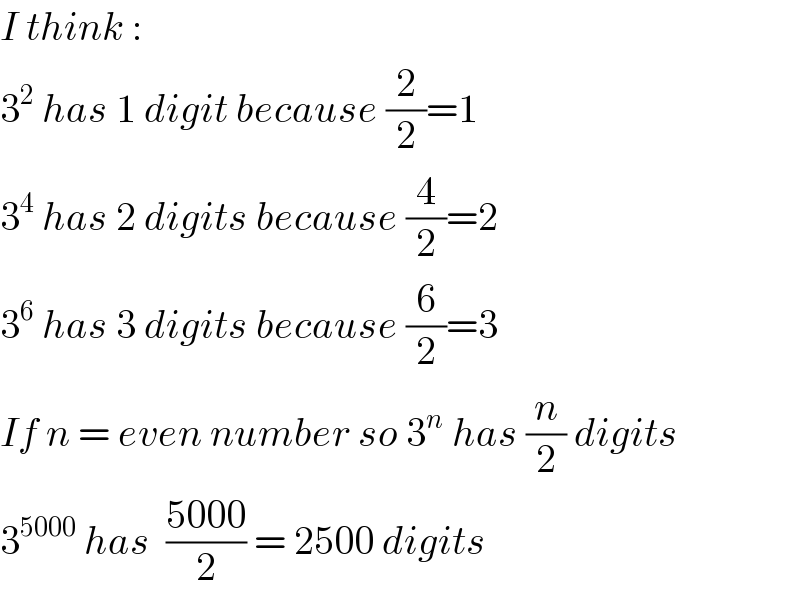
$${I}\:{think}\:: \\ $$$$\mathrm{3}^{\mathrm{2}} \:{has}\:\mathrm{1}\:{digit}\:{because}\:\frac{\mathrm{2}}{\mathrm{2}}=\mathrm{1} \\ $$$$\mathrm{3}^{\mathrm{4}} \:{has}\:\mathrm{2}\:{digits}\:{because}\:\frac{\mathrm{4}}{\mathrm{2}}=\mathrm{2} \\ $$$$\mathrm{3}^{\mathrm{6}} \:{has}\:\mathrm{3}\:{digits}\:{because}\:\frac{\mathrm{6}}{\mathrm{2}}=\mathrm{3} \\ $$$${If}\:{n}\:=\:{even}\:{number}\:{so}\:\mathrm{3}^{{n}} \:{has}\:\frac{{n}}{\mathrm{2}}\:{digits} \\ $$$$\mathrm{3}^{\mathrm{5000}} \:{has}\:\:\frac{\mathrm{5000}}{\mathrm{2}}\:=\:\mathrm{2500}\:{digits} \\ $$
Commented by Rasheed Soomro last updated on 03/Aug/16

$${Thanks}\:{Sandy}.{I}\:{had}\:{made}\:{a}\:{mistake}\:{in}\:{my}\:{answer}. \\ $$$${Now}\:{I}\:{have}\:{corrected}\:{it}. \\ $$$$ \\ $$
Answered by nume1114 last updated on 03/Aug/16
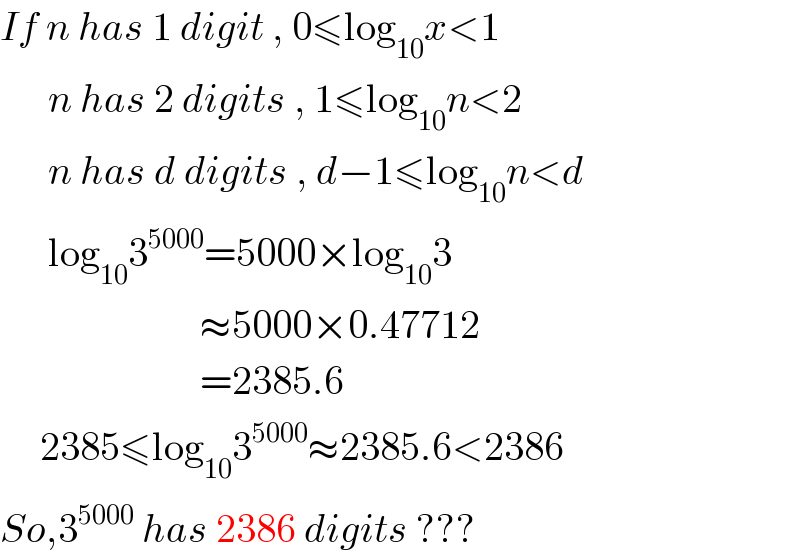
$${If}\:{n}\:{has}\:\mathrm{1}\:{digit}\:,\:\mathrm{0}\leqslant\mathrm{log}_{\mathrm{10}} {x}<\mathrm{1} \\ $$$$\:\:\:\:\:\:{n}\:{has}\:\mathrm{2}\:{digits}\:,\:\mathrm{1}\leqslant\mathrm{log}_{\mathrm{10}} {n}<\mathrm{2} \\ $$$$\:\:\:\:\:\:{n}\:{has}\:{d}\:{digits}\:,\:{d}−\mathrm{1}\leqslant\mathrm{log}_{\mathrm{10}} {n}<{d} \\ $$$$\:\:\:\:\:\:\mathrm{log}_{\mathrm{10}} \mathrm{3}^{\mathrm{5000}} =\mathrm{5000}×\mathrm{log}_{\mathrm{10}} \mathrm{3} \\ $$$$\:\:\:\:\:\:\:\:\:\:\:\:\:\:\:\:\:\:\:\:\:\:\:\:\:\approx\mathrm{5000}×\mathrm{0}.\mathrm{47712} \\ $$$$\:\:\:\:\:\:\:\:\:\:\:\:\:\:\:\:\:\:\:\:\:\:\:\:\:=\mathrm{2385}.\mathrm{6} \\ $$$$\:\:\:\:\:\mathrm{2385}\leqslant\mathrm{log}_{\mathrm{10}} \mathrm{3}^{\mathrm{5000}} \approx\mathrm{2385}.\mathrm{6}<\mathrm{2386} \\ $$$${So},\mathrm{3}^{\mathrm{5000}} \:{has}\:\mathrm{2386}\:{digits}\:??? \\ $$
Commented by Yozzii last updated on 03/Aug/16

$${Wolfram}\:{says}\:{this}\:{is}\:{correct}. \\ $$
Commented by Rasheed Soomro last updated on 03/Aug/16

$${If}\:{this}\:{is}\:{correct}\:{then}\:{what}\:{is} \\ $$$${wrong}\:{in}\:{my}\:{logic}?\:\left({See}\:{my}\:{comment}\:{above}\right) \\ $$
Commented by FilupSmith last updated on 03/Aug/16

$$\mathrm{is}\:\mathrm{there}\:\mathrm{a}\:\mathrm{way}\:\mathrm{to}\:\mathrm{prove}\:\mathrm{your}\:\mathrm{logic}? \\ $$
Commented by Yozzii last updated on 03/Aug/16
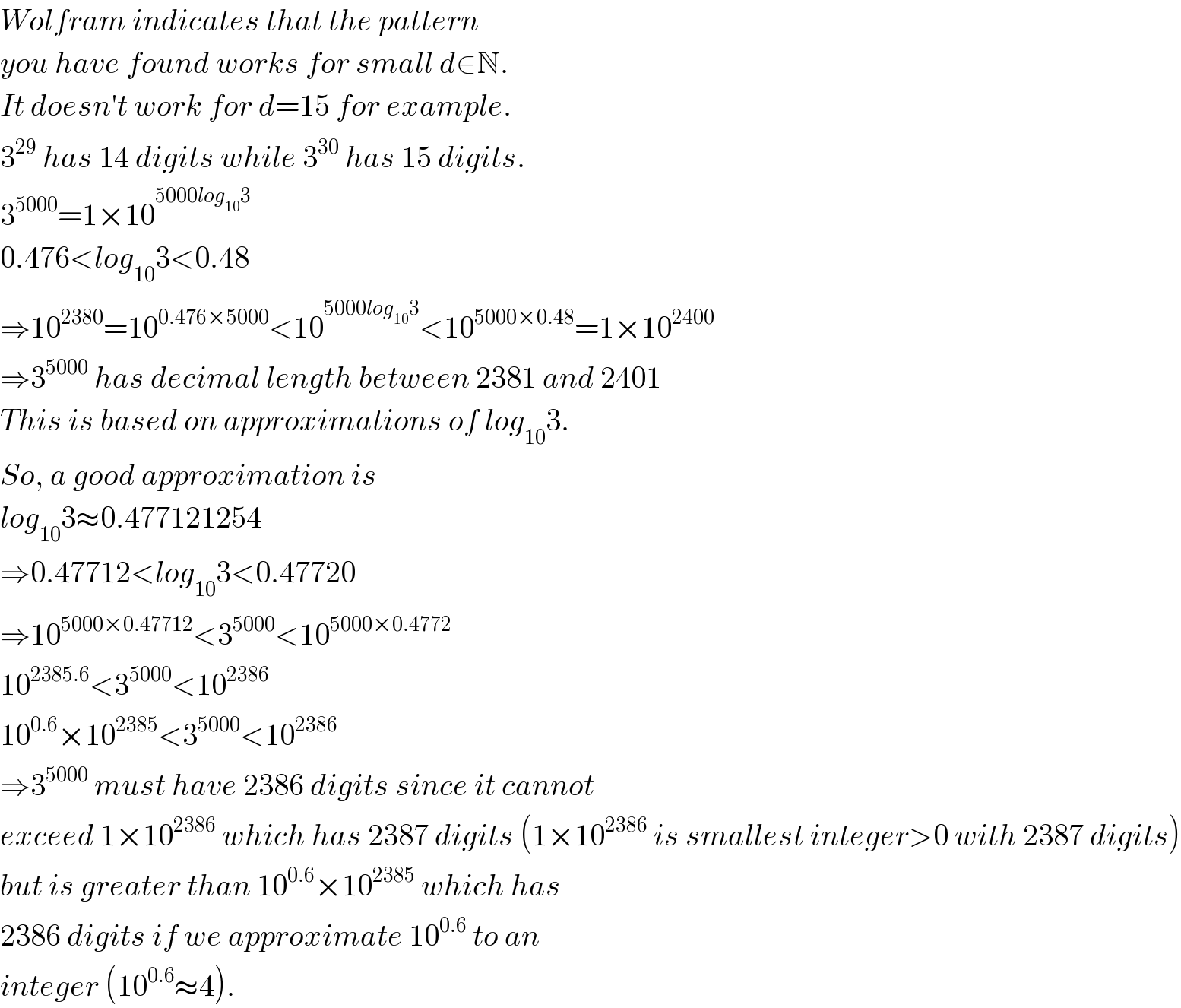
$${Wolfram}\:{indicates}\:{that}\:{the}\:{pattern} \\ $$$${you}\:{have}\:{found}\:{works}\:{for}\:{small}\:{d}\in\mathbb{N}. \\ $$$${It}\:{doesn}'{t}\:{work}\:{for}\:{d}=\mathrm{15}\:{for}\:{example}. \\ $$$$\mathrm{3}^{\mathrm{29}} \:{has}\:\mathrm{14}\:{digits}\:{while}\:\mathrm{3}^{\mathrm{30}} \:{has}\:\mathrm{15}\:{digits}. \\ $$$$\mathrm{3}^{\mathrm{5000}} =\mathrm{1}×\mathrm{10}^{\mathrm{5000}{log}_{\mathrm{10}} \mathrm{3}} \\ $$$$\mathrm{0}.\mathrm{476}<{log}_{\mathrm{10}} \mathrm{3}<\mathrm{0}.\mathrm{48} \\ $$$$\Rightarrow\mathrm{10}^{\mathrm{2380}} =\mathrm{10}^{\mathrm{0}.\mathrm{476}×\mathrm{5000}} <\mathrm{10}^{\mathrm{5000}{log}_{\mathrm{10}} \mathrm{3}} <\mathrm{10}^{\mathrm{5000}×\mathrm{0}.\mathrm{48}} =\mathrm{1}×\mathrm{10}^{\mathrm{2400}} \\ $$$$\Rightarrow\mathrm{3}^{\mathrm{5000}} \:{has}\:{decimal}\:{length}\:{between}\:\mathrm{2381}\:{and}\:\mathrm{2401} \\ $$$${This}\:{is}\:{based}\:{on}\:{approximations}\:{of}\:{log}_{\mathrm{10}} \mathrm{3}. \\ $$$${So},\:{a}\:{good}\:{approximation}\:{is}\: \\ $$$${log}_{\mathrm{10}} \mathrm{3}\approx\mathrm{0}.\mathrm{477121254} \\ $$$$\Rightarrow\mathrm{0}.\mathrm{47712}<{log}_{\mathrm{10}} \mathrm{3}<\mathrm{0}.\mathrm{47720} \\ $$$$\Rightarrow\mathrm{10}^{\mathrm{5000}×\mathrm{0}.\mathrm{47712}} <\mathrm{3}^{\mathrm{5000}} <\mathrm{10}^{\mathrm{5000}×\mathrm{0}.\mathrm{4772}} \\ $$$$\mathrm{10}^{\mathrm{2385}.\mathrm{6}} <\mathrm{3}^{\mathrm{5000}} <\mathrm{10}^{\mathrm{2386}} \\ $$$$\mathrm{10}^{\mathrm{0}.\mathrm{6}} ×\mathrm{10}^{\mathrm{2385}} <\mathrm{3}^{\mathrm{5000}} <\mathrm{10}^{\mathrm{2386}} \\ $$$$\Rightarrow\mathrm{3}^{\mathrm{5000}} \:{must}\:{have}\:\mathrm{2386}\:{digits}\:{since}\:{it}\:{cannot} \\ $$$${exceed}\:\mathrm{1}×\mathrm{10}^{\mathrm{2386}} \:{which}\:{has}\:\mathrm{2387}\:{digits}\:\left(\mathrm{1}×\mathrm{10}^{\mathrm{2386}} \:{is}\:{smallest}\:{integer}>\mathrm{0}\:{with}\:\mathrm{2387}\:{digits}\right) \\ $$$${but}\:{is}\:{greater}\:{than}\:\mathrm{10}^{\mathrm{0}.\mathrm{6}} ×\mathrm{10}^{\mathrm{2385}} \:{which}\:{has} \\ $$$$\mathrm{2386}\:{digits}\:{if}\:{we}\:{approximate}\:\mathrm{10}^{\mathrm{0}.\mathrm{6}} \:{to}\:{an} \\ $$$${integer}\:\left(\mathrm{10}^{\mathrm{0}.\mathrm{6}} \approx\mathrm{4}\right). \\ $$
Commented by nume1114 last updated on 03/Aug/16
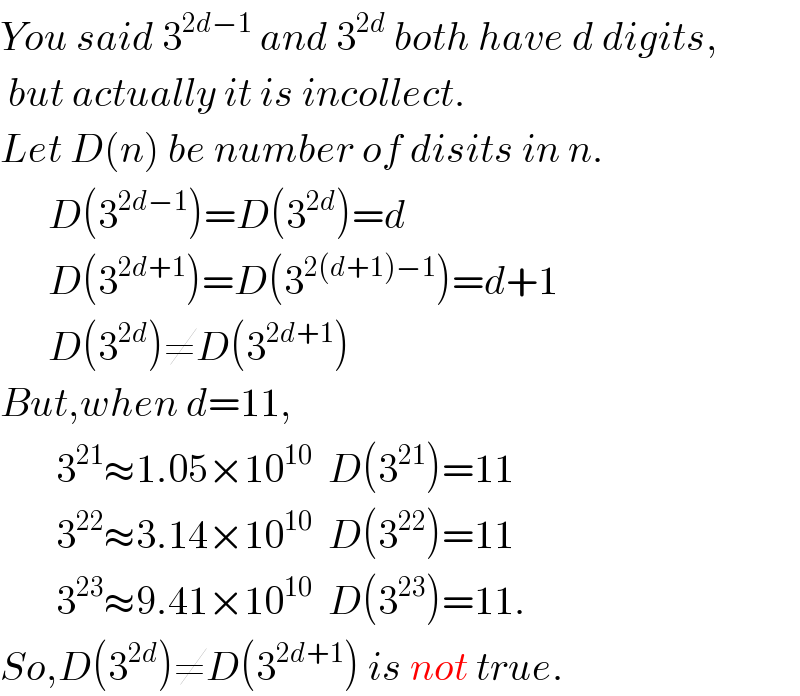
$${You}\:{said}\:\mathrm{3}^{\mathrm{2}{d}−\mathrm{1}} \:{and}\:\mathrm{3}^{\mathrm{2}{d}} \:{both}\:{have}\:{d}\:{digits}, \\ $$$$\:{but}\:{actually}\:{it}\:{is}\:{incollect}. \\ $$$${Let}\:{D}\left({n}\right)\:{be}\:{number}\:{of}\:{disits}\:{in}\:{n}. \\ $$$$\:\:\:\:\:\:{D}\left(\mathrm{3}^{\mathrm{2}{d}−\mathrm{1}} \right)={D}\left(\mathrm{3}^{\mathrm{2}{d}} \right)={d} \\ $$$$\:\:\:\:\:\:{D}\left(\mathrm{3}^{\mathrm{2}{d}+\mathrm{1}} \right)={D}\left(\mathrm{3}^{\mathrm{2}\left({d}+\mathrm{1}\right)−\mathrm{1}} \right)={d}+\mathrm{1} \\ $$$$\:\:\:\:\:\:{D}\left(\mathrm{3}^{\mathrm{2}{d}} \right)\neq{D}\left(\mathrm{3}^{\mathrm{2}{d}+\mathrm{1}} \right) \\ $$$${But},{when}\:{d}=\mathrm{11}, \\ $$$$\:\:\:\:\:\:\:\mathrm{3}^{\mathrm{21}} \approx\mathrm{1}.\mathrm{05}×\mathrm{10}^{\mathrm{10}} \:\:{D}\left(\mathrm{3}^{\mathrm{21}} \right)=\mathrm{11} \\ $$$$\:\:\:\:\:\:\:\mathrm{3}^{\mathrm{22}} \approx\mathrm{3}.\mathrm{14}×\mathrm{10}^{\mathrm{10}} \:\:{D}\left(\mathrm{3}^{\mathrm{22}} \right)=\mathrm{11} \\ $$$$\:\:\:\:\:\:\:\mathrm{3}^{\mathrm{23}} \approx\mathrm{9}.\mathrm{41}×\mathrm{10}^{\mathrm{10}} \:\:{D}\left(\mathrm{3}^{\mathrm{23}} \right)=\mathrm{11}. \\ $$$${So},{D}\left(\mathrm{3}^{\mathrm{2}{d}} \right)\neq{D}\left(\mathrm{3}^{\mathrm{2}{d}+\mathrm{1}} \right)\:{is}\:{not}\:{true}. \\ $$
Commented by Rasheed Soomro last updated on 04/Aug/16
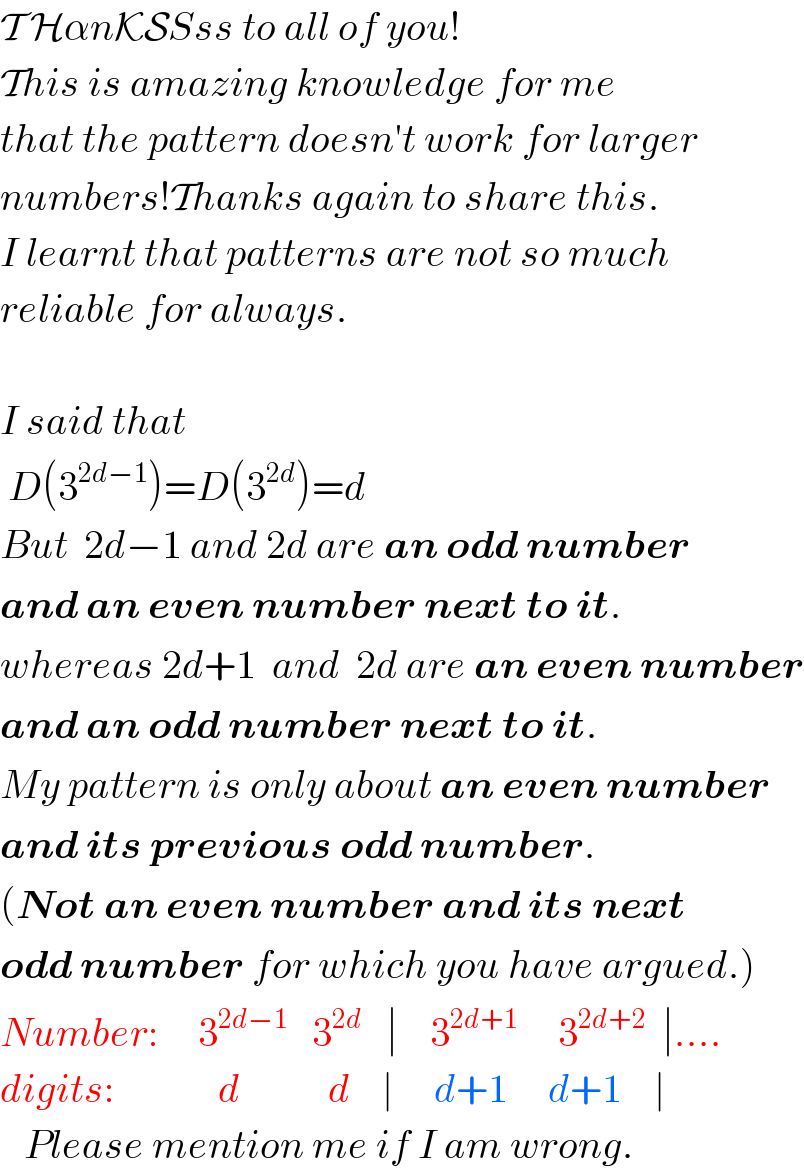
$$\mathcal{T}\:\mathcal{H}\alpha{n}\mathcal{KS}{Sss}\:{to}\:{all}\:{of}\:{you}! \\ $$$$\mathcal{T}{his}\:{is}\:{amazing}\:{knowledge}\:{for}\:{me}\: \\ $$$${that}\:{the}\:{pattern}\:{doesn}'{t}\:{work}\:{for}\:{larger} \\ $$$${numbers}!\mathcal{T}{hanks}\:{again}\:{to}\:{share}\:{this}. \\ $$$${I}\:{learnt}\:{that}\:{patterns}\:{are}\:{not}\:{so}\:{much} \\ $$$${reliable}\:{for}\:{always}. \\ $$$$ \\ $$$${I}\:{said}\:{that} \\ $$$$\:{D}\left(\mathrm{3}^{\mathrm{2}{d}−\mathrm{1}} \right)={D}\left(\mathrm{3}^{\mathrm{2}{d}} \right)={d} \\ $$$${But}\:\:\mathrm{2}{d}−\mathrm{1}\:{and}\:\mathrm{2}{d}\:{are}\:\boldsymbol{{an}}\:\boldsymbol{{odd}}\:\boldsymbol{{number}} \\ $$$$\boldsymbol{{and}}\:\boldsymbol{{an}}\:\boldsymbol{{even}}\:\boldsymbol{{number}}\:\boldsymbol{{next}}\:\boldsymbol{{to}}\:\boldsymbol{{it}}. \\ $$$${whereas}\:\mathrm{2}{d}+\mathrm{1}\:\:{and}\:\:\mathrm{2}{d}\:{are}\:\boldsymbol{{an}}\:\boldsymbol{{even}}\:\boldsymbol{{number}} \\ $$$$\boldsymbol{{and}}\:\boldsymbol{{an}}\:\boldsymbol{{odd}}\:\boldsymbol{{number}}\:\boldsymbol{{next}}\:\boldsymbol{{to}}\:\boldsymbol{{it}}.\: \\ $$$${My}\:{pattern}\:{is}\:{only}\:{about}\:\boldsymbol{{an}}\:\boldsymbol{{even}}\:\boldsymbol{{number}} \\ $$$$\boldsymbol{{and}}\:\boldsymbol{{its}}\:\boldsymbol{{previous}}\:\boldsymbol{{odd}}\:\boldsymbol{{number}}. \\ $$$$\left(\boldsymbol{{Not}}\:\boldsymbol{{an}}\:\boldsymbol{{even}}\:\boldsymbol{{number}}\:\boldsymbol{{and}}\:\boldsymbol{{its}}\:\boldsymbol{{next}}\right. \\ $$$$\left.\boldsymbol{{odd}}\:\boldsymbol{{number}}\:{for}\:{which}\:{you}\:{have}\:{argued}.\right) \\ $$$${Number}:\:\:\:\:\:\mathrm{3}^{\mathrm{2}{d}−\mathrm{1}} \:\:\:\mathrm{3}^{\mathrm{2}{d}} \:\:\:\mid\:\:\:\:\mathrm{3}^{\mathrm{2}{d}+\mathrm{1}} \:\:\:\:\:\mathrm{3}^{\mathrm{2}{d}+\mathrm{2}} \:\:\mid.... \\ $$$${digits}:\:\:\:\:\:\:\:\:\:\:\:\:\:{d}\:\:\:\:\:\:\:\:\:\:\:{d}\:\:\:\:\mid\:\:\:\:\:{d}+\mathrm{1}\:\:\:\:\:{d}+\mathrm{1}\:\:\:\:\mid \\ $$$$\:\:\:{Please}\:{mention}\:{me}\:{if}\:{I}\:{am}\:{wrong}. \\ $$
Commented by Tawakalitu. last updated on 03/Aug/16

$${Thanks}\:{so}\:{much}\:..\:{i}\:{really}\:{appreciate}\:{your}\:{effort} \\ $$
Commented by nume1114 last updated on 04/Aug/16

$${Sorry},{my}\:{explain}\:{wasn}'{t}\:{good}. \\ $$$${But},\:\mathrm{3}^{\mathrm{24}} \approx\mathrm{2}.\mathrm{82}×\mathrm{10}^{\mathrm{11}} ,{D}\left(\mathrm{3}^{\mathrm{24}} \right)=\mathrm{12}. \\ $$$${Remember},{D}\left(\mathrm{3}^{\mathrm{23}} \right)=\mathrm{11}. \\ $$$${So},{D}\left(\mathrm{3}^{\mathrm{2}{d}−\mathrm{1}} \right)\neq{D}\left(\mathrm{3}^{\mathrm{2}{d}} \right)\:{when}\:{d}=\mathrm{12}. \\ $$
Commented by Rasheed Soomro last updated on 04/Aug/16

$$\mathcal{T}{hank}\mathcal{S}!\:{This}\:{is}\:{what}\:{Yozzi}\:{have}\:{said} \\ $$$${that}\:{for}\:{larger}\:{numbers}\:{the}\:{pattern}\:{doesn}'{t} \\ $$$${work}. \\ $$
